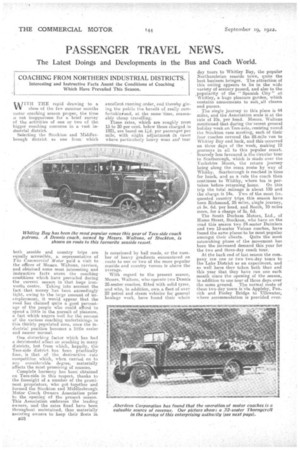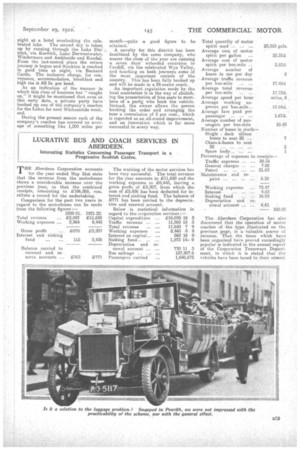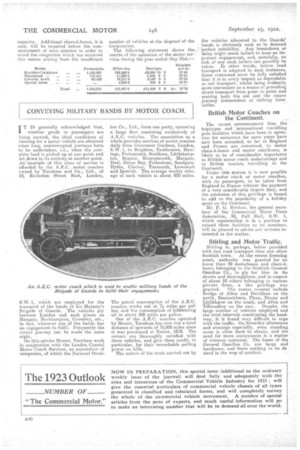PASSENGER TRAVEL NEWS.
Page 22

Page 23

Page 24

If you've noticed an error in this article please click here to report it so we can fix it.
The Latest Doings and Developments in the Bus and Coach World.
COACHING FROM NORTHERN INDUSTRIAL DISTRICTS.
. Interesting and Instructive Facts Anent the Conditions of Coaching Which Have Prevailed This Season.
WITH THE rapid drawing to a close of the few summer months motor coaching season proper, the time ,s not inopportune for a brief survey of the activities of one or two of the bigger coaching concerns in a vast industrial district.
Selecting the Stockton and MiddTesbrough district, as one from which
both seaside and country trips are equally accessible, a representative of T lie Commercial Motor paid a visit to the offices of Messrs. Waltons, carriers, and obtained some most interesting and instructive facts anent the coaching conditions which have prevailed during the current season in that huge ironworks centre. Taking into account the tact. that money has been exceedingly tight, owing to the large amount of unemployment, it would appear that the road has claimed quite a good percentage of the people who could afford to spend a little in the pursuit of pleasure, a fact which augers well for t110 Success of the various coaching undertakings in this thickly populated area, once the industrial position becomes a little easier and nearer normal. One disturbing factor which has had a. cletrithental affect on coaching in many districts, but from which, happily, the Tees-side district has been practically free,, is that of the destructive -rate competition which, when carried on to any considerable degree, ' materially affects the most promising of seasons.
• Complete harmony has been obtained on Tees-side in this respect, thanks to the foresight of a number of the promimilt proprietors, who got together and formed the Stockton and Middlesbrough Motor Coae,h Owners Association prior to the opening of the present season. This Association embraces the leading owners, and the rates fixed have been throughout maintained, thus materially assisting owners to keep their fleets in 33:38
excellent running order, and thereby giving the public the benefit of really cornfortabletand, at the same.-time, reasonably cheap travelling.
These rates, which are roughly from 15 to 20.per cent, below those charged in 1921, are based on 1d. per passenger per mile, with slight adjustment in cases where particularly heavy wear ant' tear is occasioned by had roads, or the number of heavy gradients encountered en route to one or two of the more popular seaside and country venues is above the average.
With regard to the. present season, Messrs. Waltons, who operate two Dennis 28-seater coaches, fitted with solid tyres, and who, in addition, own a fleet of over 20 petrol and steam vehicles for general haulage work, have found their whole day tours to Whitley Bay, the popular Northumbrian seaside town, quite the best business bringer. The attraction of this outing appears to lie in the wide variety of scenery passed, and also to the _popularity of the " Spanish City" at Whitley, a huge pleasure garden, which contains amusements to Snit , all Classes and purses. . The single journey to this place is 44 miles, and the Association scale is at the rate of 10s, per bead. Messre. Waltons mentioned that during the recent.general holiday week on Tees-side, centring round the Stockton race meeting, each of their four coaches covered the 88-mile run to Whitley Bay and back, and this occurred on three days of the week, making 12 journeys in all to this popular resort. Scarcely less favoured is the circular tour to Scarborough, which is niade over the Yorkshire Moors, the return journey being along the coast route by way of Whitby. Scarborough is reached in time for lunch, and as a rule the coach then continues to Whitby, where tea is partaken before returning home. On this trip the total mileage is about. 130 and the charge. is 14s. Two of the most frequented country trips this season have been Richmond, 25 miles, single journey, at 5s. 6d. per head, and Reeth, 10 miles more, for a charge of 8s. 6d, The South Durham Motors, Ltd., ciif Hume Street, Stockton, who have on the road this season two 24-seater Daimlers and two 15-seater Vulcan coaches, have found the same places" to be most popular amongst their clients. Quite the most astonishing phase of the movement has been the increased demand this year for the two and three-day coach tour.
At the back end of last season the company ran one or two two-day tours to the Lake District RS an experiment, and so well have they taken both then and this year that they have run one each month since the opening of the season, in addition to one tour of three days over the same ground. . The normal route of these two-day tours is via,-Appleby, Pen. rith and Pooley Bridge to 1711swater, where accommodation is provided over. night at a, hotel overlooking the celebrated lake. The second day is taken up by running through the take Dis= trict, via _Keswick, Lake Derwentwater, Windermere and Ambleside and Kendal. From the last-named place the return journey is begun and Stockton is reached in good time at night, via Barnard Castle. The inclusive charge, for conveyance, accommodation, breakfast and high tea is £2 2s. per head.
As an indication of the manner in which this &ass of business has "caught on," it might be mentioned that even at this early date, a private party have booked up one of the company's coaches for the Lakes for next. Whitsuntide weekend.
During the present season each of till, company's coaches has covered an average of something like 1,200 miles per month—quite a good figure to be attained.
A novelty for this district has been instituted by the same company, who nearer the close of the year are running a seven days extended excursion to Cardiff, via the celebrated Wye Valley, and touching on both journeys some of the most important centres of the country. This has been fully booked up and will be made in a 24-seater coach.
An important regulation made by the local association is in the way of abolishing the presentation of free seats to members of a party. who book the vehicle. Instead, the owner allows the person booking the order and arranging the tour a commission of 5 per cent., which is regarded as an all-round improvement, and an innovation which is far more successful in every way.
LUCRATIVE BUS AND COACH SERVICES IN ABERDEEN.
Interesting Statistics Concerning Passenger Transport in a Progressive Scottish Centre.
TH-E Aberdeen Corporation accounts for the year ended May 31st state that the revenue from the motorbuses shows a. considerable increase over the previous year, so that the combined receipts, amounting to £196,268, constitute a record for the undertaking.
Comparison for the past two years in regard to the motorbuses can be made from the following figures :— The working of the motor services has been very successful. The total revenue for the year amounts to £11,650 and the working expenses to £8,443, leaving a gross profit. of .£3,207, from which the sum of £2,436 has been deducted for interest and sinking fund. The balance of £771 has been carried to the depreciation and renewal account.
Below is statistical information in regard to the corporation services :— £16,095 16 8 11,503 15 3 11,650 7 9 8,44.3 5 9 562 16 0 1,873 1.4,, 9
Capital expenditure Traffic revenue Total revenue ... Working expenses Interest on capital... Sinking fund... Depreciation and re The Aberdeen Corporation has also discovered that the operation of motor coaches of the type illustrated on the previous page, is a valuable source of revenue. That the tours which have been organised have proved exceedingly popular is indicated in the annual report of the Corporation Tramways Department, in which it is stated that the vehicles have been taxed to their utmost capacity. Additional chars-it-bancs,. it is said, will be required before the com mencement of •next summer in order' to avoid the congestion which has occurred. this season arising from the insufficient number of vehicles at-the disposal of the Corporation.
The following statement shows the..,
results of the operation of the motor services during the year ended May 31st ;—
CONVEYING MILITARY BANDS BY MOTOR COACH.
I T IS generally acknowledged that, whether goods or passengers are being carried, the ideal conditions of running for a motor vehicle are obtained when long, uninterrupted journeys have to be undertaken, i.e., when the complete load is picked up at one point and set down in its entirety at another point. An'example of this class of service is afforded by the A.E.C. motor coaches owned by Turnham and Co., Ltd., of 10, Eccleston Street East, London, S.W. 1, which are employed for the transport of the bands of his Majesty's Brigade of Guards. The vehicles ply between London and such places as Margate, Northampton, Coventry, etc., in fact, wherever one of the bands has an engagement to fulfil. Frequently the return journey can be made the same night.
On this service Messrs. Turnham work in conjunction with the London Coastal Motor Coach Services, an association of ecmpanies, of which the National Omni
bus Co., Ltd., form one party, operating a large fleet consisting exclusively of A.E.C. vehicles. The association as a whole provides services of motor coaches daily from Grosvenor Gardens, London, S.W. 1, to Brighton, Eastbourne, Hastings, Portsmouth, Southsea, Littlehampton, Bognor, Bournemouth, Margate, Deal, Herne Bay, Folkestone, Sandgate, Ilythe, Clacton, Yarmouth, Lowestoft and Ipswich. The average weekly mileage of each vehicle is about 850 miles.
The petrol consumption of the A.E.C. coaches works out at 7i miles per gallon, and the consumption of lubricating oil at about 300 miles per gallon.
One of the A.E.C. coaches operated by Messrs. Turnham has now run a total distance of upwards of 75,000 miles since it was purchased at Easter, 1919. The owners are thoroughly satisfied with these vehicles, and give them credit, in particular, for their remarkable pulling power on hills. The nature of the work carried out by
the vehicles allocated to the Guards' bands is obviously such as to demand 1perfect reliability. Any breakdown or delay might mean failure to keep an important engagement, and, naturally, no risk of any such failure can possibly be taken. In other words, before road transport is adopted in such instances, those concerned must be fully satisfied that it is in every respect as dependable as rail transport, whilst being evidently more convenient as a mean's of providing direct transport from point to point and making both the out and the return journey independent of railway timetables.
British Motor Coaches on the Continent.
The recent, announcement that thetriptyque and international travelling pass facilities which have been in operation for motorcars for some years have now been extended, se far as England and France are concerned, . to motor chars-a-bancs and motor omnibuses, is likely to be of conSiderable importance to British motor coach undertakings and to British tourists travelling to the Continent.
Under this system it is now possible for a motor coach or motor omnibus, with its passengers, to be taken from England to France without the payment of a very considerable import duty, and the extension of this privilege is bound to add to the popularity of a holiday spent on the Continent.
Mr. F. G. Bristow, the general secretary of the Commercial Motor Users Association, 50, Pall Mall, S.W. 1, which organization is in a position to. extend these facilities to its members, will be pleased to advise any neesons interested in the matter.
Stirling ,and Motor Traffic.
Stirling is, perhaps, better provided with fast road transport than any other Scottish town. At the recent licensing court, authority was granted for no fewer than. 40 motorbuses and chars-&banes belonging to the Scottish General Omnibus Co., to ply for hire in its streets and thoroughfares. and in respect of about 10 others belonging to various private firms, a like privilege was granted. The routes covered include Bridge of Allan and Dunblane on the north, Bannockburn, Plean, Denny and Linlithgow on the south, and Alloa and Tillicoultry on the east. Despite the large number of vehicles employed and the brief intervals constituting the headway, it is found very difficult to cope with the traffic. On Saturday afternoons arid evenings especially, even standing room is often hard to obtain, and the need for more conveyances is a matter of common comment. The buses of the General Omnibus Co. are large and handsome, and leave nothing to be de sired in the way of comfort.






























